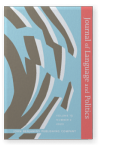Vol. 19:2 (2020) ► pp.331–351
Identity construction and negotiation in Chinese political discourse
A case analysis of the fire in the Daxing District
Based on identity theory and previous studies of crisis discourse, this paper systematically analyzes the process of identity construction and negotiation between political discourse and social discourse representing the event of a fire at Xinjian Village, Daxing District in the southern suburb of Beijing. It is found that in the first phase, the political discourse focuses on the meta-discourse of “for Renmin’s sake, we carry out a campaign of thorough inspection, cleaning-up and rectification to eliminate safety hazards.” In the second phase of the event the Renmin category is then represented concretely as “residents”, “migrant workers”, “people who need help” and so on. These discursive practices have constructed a relatively acknowledged identification with the social groups concerned, and thus positively affect the governance and management of this crisis event.
Article outline
- 1.Introduction
- 2.Research data and objectives
- 3.Literature review
- 3.1Discourse construction of identity
- 3.2Studies on crisis discourse
- 3.3Renmin discourse
- 4.Identity construction and consultation
- 4.1Discourse participants and evaluation
- 4.2Discourse construction and negotiation of Renmin
- 4.3Discourse negotiation of “special campaign”
- 4.4Collective demand and individual emotion
- 5.The negotiation of the identity construction
- 6.Conclusion
- Acknowledgements
- Notes
-
References
